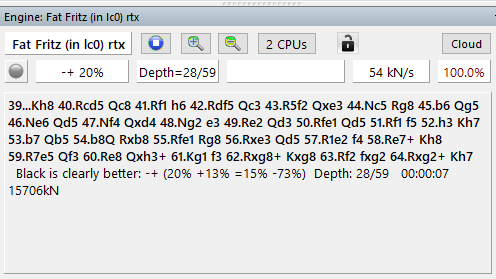|
Fat Fritz Engine |

|

|
|
|
Fat Fritz Engine |

|

|
Fat Fritz Engine
At the end of 2017 the AlphaZero project created a furore in the computer chess scene. This new program followed a totally different approach from the chess engines which had been developed by standard techniques over a period of many years. AlphaZero questioned many rules and principles which for years had been considered indispensable for the development of programs. This program simply knows the rules of the game and takes advantage of sophisticated algorithms concerning the ability to learn. Its playing strength is established exclusively on the basis of games it itself has played and analysed! AlphaZero gets by without having assimilated programmed specialised knowledge and after only a few hours of training it was able to measure up to the best specialised programs. Unfortunately AlphaZero is purely a research project and is not available to interested chess players.
After the attention grabbing success of AlphaZero the Open Source project Leela Chess Zero, or Lc0, was founded. The goal it set was to offer to users who were interested in chess an engine which works with techniques similar to those behind AlphaZero. The results achieved so far are extremely promising and a up-to-date version of Lc0 is part of the Fritz bundle.

The neural engine Fat Fritz is based on the open source project LCZero and offers many similar routines. However, the neural network was not trained/developed by games against itself (“Zero” approach). The playing strength of Fat Fritz is based on analyses of games from the Mega Database, computer games and the endgame databases. The results obtained by us internally against other top programs are very promising and we are proud to be able to offer to our users this strong and conceptually novel program.
The best way to understand the difference between Fat Fritz and traditional engines is by looking at the development of the engine. Thus, traditional engines learn at a very early stage – as do most beginners – what the values of the various pieces are. Fat Fritz started to learn chess without this information. Instead it was fed with literally billions of different positions which it examined in order to develop on this foundation its own understanding of chess. So Fat Fritz, unlike classic chess programs, does not operate based on material considerations and neither can nor should do so. The engine judges a position purely on win or loss ratios. The result of this is that there is no petty counting of material, it impartially plays for position.
This is more than just an interesting detail, but something of great practical relevance. Since in a whole series of positions a traditional engine sees no way to improve on the position with best play for both sides and therefore evaluates it as absolutely level with a value of 0.00. Fat Fritz perhaps also evaluates such positions as level, but the engine also sees which of these positions tend more frequently than others to lead to a decisive result. Nowadays opening analyses rarely lead directly to a win against a well-prepared opponent and so it is helpful to know which moves or which positions provide the opponent with the greatest chances of making a mistake.
The engine works with the probability of a win instead of evaluations of positions! So in the evaluation the factor which is taken into account above all else is the probability of a win. To achieve that the engine plays through thousands of games at a speed of under a hundred to several tens of thousands per second (N/S), no matter which version. One peculiarity of Fat Fritz consists of the fact that the engine also makes use of the resources of the high performance processors of the graphics card! This leads to a clear acceleration of the performance! Fat Fritz supports the RTX Mode as well as the CUDA Mode which at the time of writing is supported exclusively by the NVIDIA graphics cards.
From the description it becomes clear that Fat Fritz requires a very high performance graphics card, e.g. a NVIDIA RTX 2060, in order to achieve the performance of which it is capable. Without an appropriate GPU (graphics processor) the program can be slowed down by a factor of 1000, a fact you must take into account when experimenting with the engine. Therefore Fat Fritz can be used on a pure CPU (main processor), but nothing resembling its playing strength on a fast GPU can be achieved.
Tip: Whenever you weigh up whether to acquire an NVIDIA card, you need to take into account whether your network provides you with sufficient reserves for the desired performance. In compact and power saving desktop PCs it is possible that there are no slots into which to plug such graphics cards. It is absolutely necessary to clear this up before the purchase of a GPU (graphics card). Ready-made gaming computers with, e.g., AMD Ryzen processor and an RTX graphics card can be had at the moment from around €1100.
On a test computer with RTX 2080 in RTX mode the speed is around 20 thousand positions per second, in CUDA mode approx. 45% of that. Older graphics cards achieve clearly lower values, only NVIDIA cards support the two modes mentioned, CUDA or RTX!